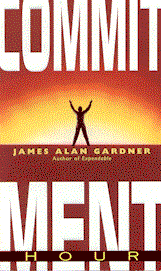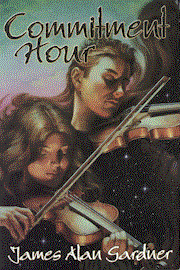
Avon Eos paperback - 343 pages (left)
hardcover - Book Club edition - 248 pages (right)
cover art by Stephen Hickman

Denver Science Fiction & Fantasy Book Club |
 |
Commitment Hour (1998) Avon Eos paperback - 343 pages (left) hardcover - Book Club edition - 248 pages (right) cover art by Stephen Hickman |

|
| Dan | 6 | Amy | 6 |
 |
10 Wow! Don't miss it 8-9 Highly recommended 7 Recommended 5-6 Mild recommendation 3-4 Take your chances 1-2 Below average; skip it 0 Get out the flamethrower! U Unfinishable or unreadable - Skipped or no rating given |
| Cheri | 7 | Barb | 5 | ||
| Aaron | 10 | Cynthia | 6 | ||
| Lindsey | - | Jackie | 8 | ||
| Kerry | 5 | Jeanne | 6 | ||
| Gene | 5 | Richard | 7 |
|
Aaron's Commentary
James Alan Gardner - Commitment Hour
As demonstrated by the lukewarm ratings most of the group gave this novel, it might not appeal to everyone. But I liked it very much. For one thing, I give Gardner a lot of points for pulling off some very difficult challenges. I think it's hard to write an engaging story built around such a self-absorbed and obnoxious, but not evil, protagonist. I found that I liked Fullin, the main character, despite his obvious failings. I thought he developed significantly over the course of the book, yet remained delightfully narcissistic at the end, and in a way that I suspect is unprecedented in all of literature. This is also the first book I can recall reading that took place in 24 hours without seeming contrived. Gardner managed to evoke all of the responses he was aiming for from me. I laughed at his humor; I was furious at Steck's actions at the end; I enjoyed all of the outrageous characters and lines (including the opening line), many of which reminded me of a good Northern Exposure episode. I was intrigued by the moral issues that Gardner raised. Was it wrong to set up this society? Is Steck's response in any way justifiable? Is it okay to have rigid sex roles, if people get to choose which sex they're going to be? Gardner's postulate that people would behave very differently depending on whether they're male or female at the time is not politically correct, but I'm not convinced that it's less plausible than, say, The Left Hand of Darkness, where people generally behave the same way regardless of their gender at the time. This book certainly invites comparison to The Left Hand of Darkness, an all-time classic and a favorite of mine, because of its premise, but it reminded me of Ursula LeGuin for another reason. The nuances of Gardner's society are reminiscent of LeGuin's sociologically oriented fiction. (Of course, Gardner is not as elegant a writer as LeGuin, but who is?) Little things like the "visits" at first snowfall, Father Ash and Mistress Snow, the ceremonies for the dead, even the tradition of taking pieces off the old car, all make this a believable and interesting culture. And Gardner always introduces such elements in a way that illuminates the characters or advances the story. Gardner is a newcomer and still relatively unknown (although he did receive a Hugo and Nebula nomination for his outstanding novelette "Three Hearings on the Existence of Snakes in the Human Bloodstream"), but I think he merits much more attention from the SF community. What do you think? Your comments are welcome. Please send them to vanaaron@excite.com |